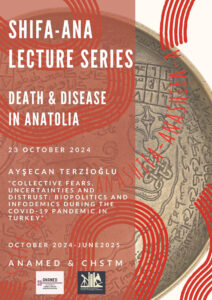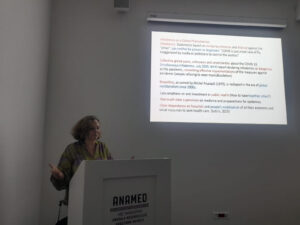

On October 23, 2024, Ayşecan Terzioğlu presented the second lecture of the SHIFA-ANA lecture series at ANAMED, Beyoğlu to a worldwide audience both in person and online.
In the Anthropocene marked by disasters and diseases, the historical reservoir of images, metaphors, and discourses, which were used to describe the sick and stricken, are often revisited by the societies and states. The old patterns of marginalization and stigmatization against the “other” inform new ones both in social discourses and states’ policies, causing “infodemics,” considered as dangerous as the COVID-19 pandemic by the World Health Organization. Turkey is one of the worst-hit countries by the pandemic and the infodemics, which includes conspiracy theories and distrust against the political and medical authorities, as well as marginalization and stigmatization. Based on an extensive media analysis and a survey on the most common infodemic statements during the pandemic, this talk explores the social and demographic factors shaping the infodemics in Turkey, such as gender, age, political opinions and religious beliefs. Using the theoretical frameworks in Foucault’s biopolitics and Baudrillard’s simulacra, it will suggest more effective ways of addressing lay people’s collective fears and uncertainties in order to implement more inclusive health policies.
Ayşecan Terzioğlu is a faculty member at Sabancı University, Cultural Studies and Gender Studies Programs. She earned her Ph.D. degree in Cultural Anthropology, at the City University of New York, the Graduate Center, following her B.A. and M.A. degrees at Boğaziçi University, Department of Sociology. Her research and teaching interests include globalization and health inequalities, illness experiences and narratives, hate speech, Middle Eastern studies, anthropology of the body, gender, social studies on temporality and spatiality. She has several articles and edited books on these topics. She is in the coordinating committee of the RHWG (Reproductive Health Working Group) and directory board of AMEA (Association of Middle East Anthropology)
Ayşecan Terzioğlu has kindly provided a bibliography of suggested readings for those interested in the topic:
Adam B, Beck U & J. Van Loon J, Risk Society and Beyond: Critical Issues for Social Theory, Introduction, 2007 pg. 1-31. London: Sage Publications
Baudrillard, J. 1995 The Gulf War did not Take Place. Indiana University Press.
Cassese E., Farhart C.&J. Miller 2020 Gender Differences in COVID-19 Conspiracy Theory Beliefs. Politics & Gender, 16(4) 1009-1018
Foucault M. 1979. The Birth of Biopolitics: Lectures at the College de France, 1978-1979. Picador
Martinez RM. 2021 “Covid-19 and Social Stigma in Hospitals: A New Epidemic of Signification?” Medical Anthropology 40(7) 667-681
Parmaksız P.M.Y. 2023 Gendered Experiences during COVID-19 in Turkey and the Meaning of Home. Gender, Place
and Culture
Ranger T. &P. Slack. 1992 Epidemics and Ideas: Essays on the Historical Perception of Pestilence. Introduction.
Cambridge University Press
Sotiris P. 2020 Thinking Beyond the Lockdown: On the Possibility of a Democratic Biopolitics. Historical Materialism
28(3) 3-38
Soytemel E.&Saglam E. 2024 “Conspiratorial Narratives as Cultural Repertoires and Methodological Tools.” British Journal of Sociology 1-15
Sturm T& T. Albrecht. 2021 “Constituent Covid-19 Apocalypses: Contagious Conspiracism, 5G, and Viral Vaccinations’. Anthropology&Medicine”, 128(1): 122-139